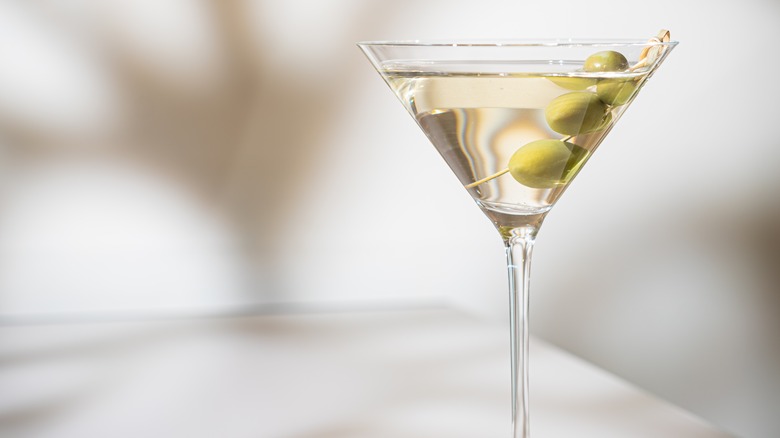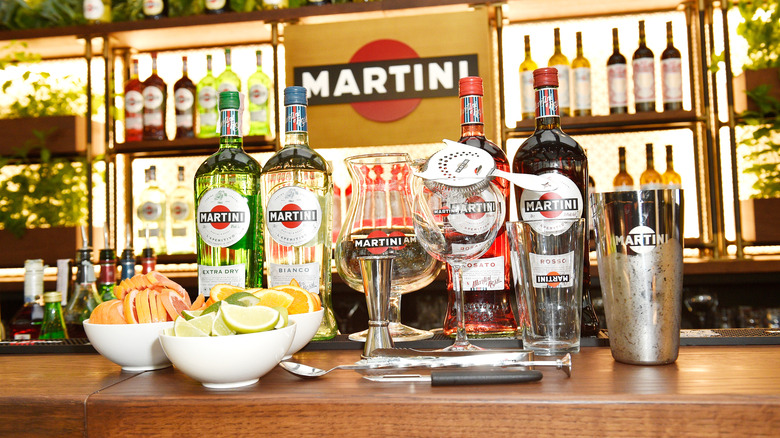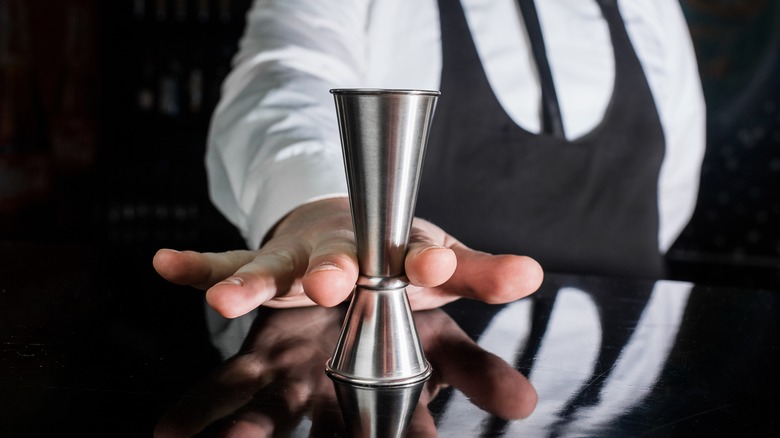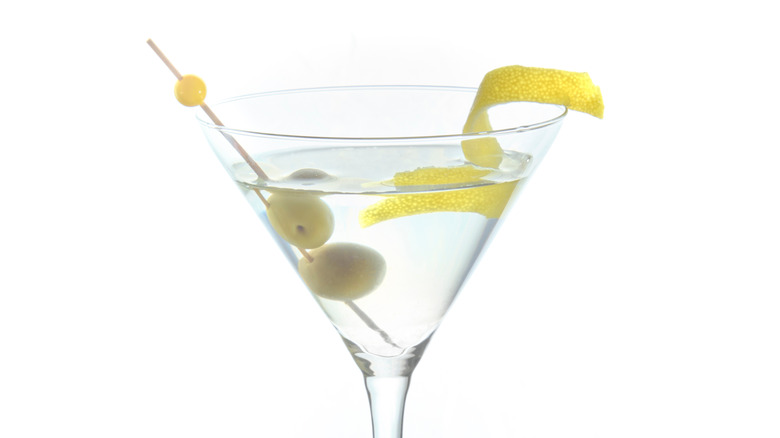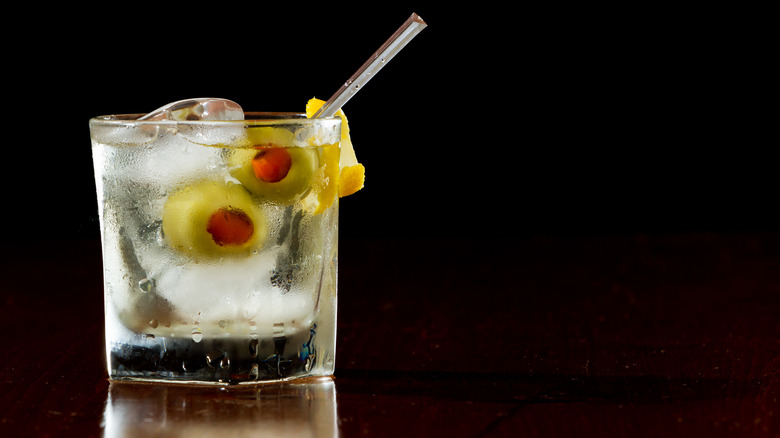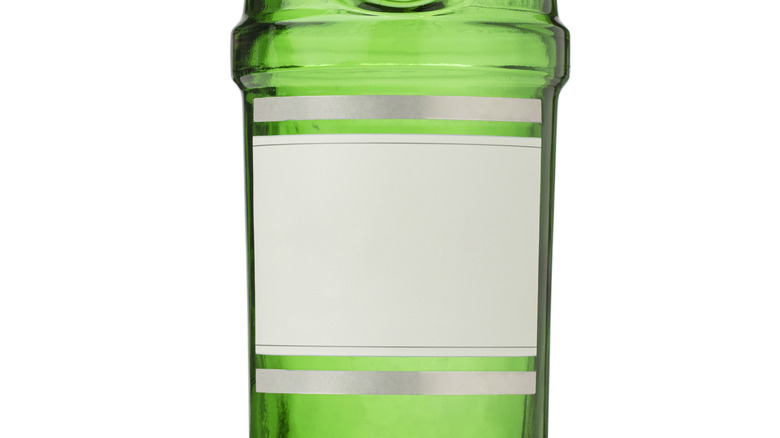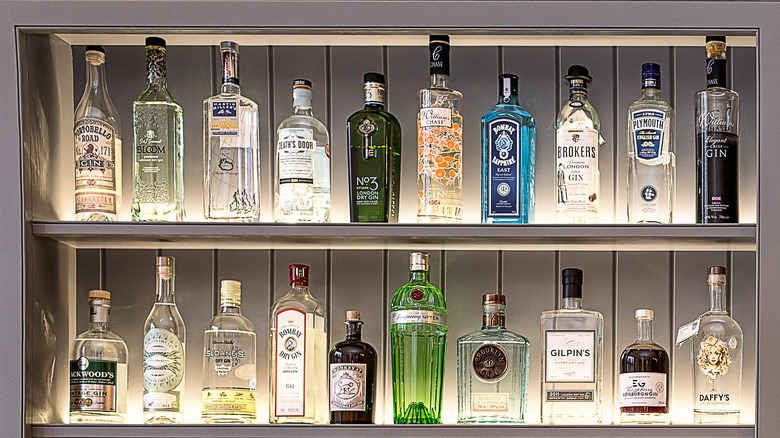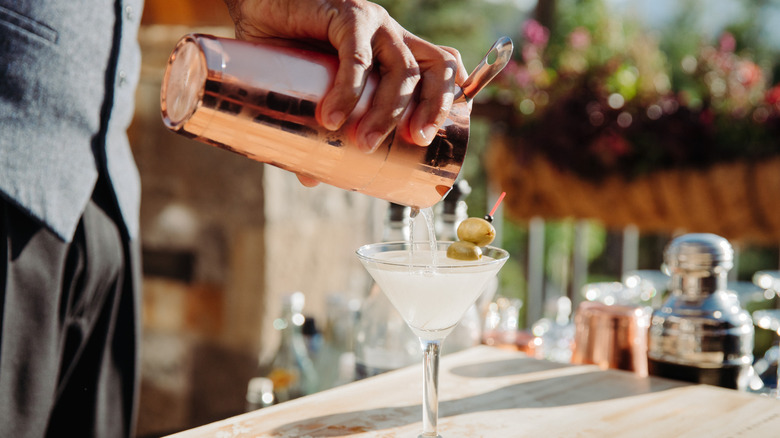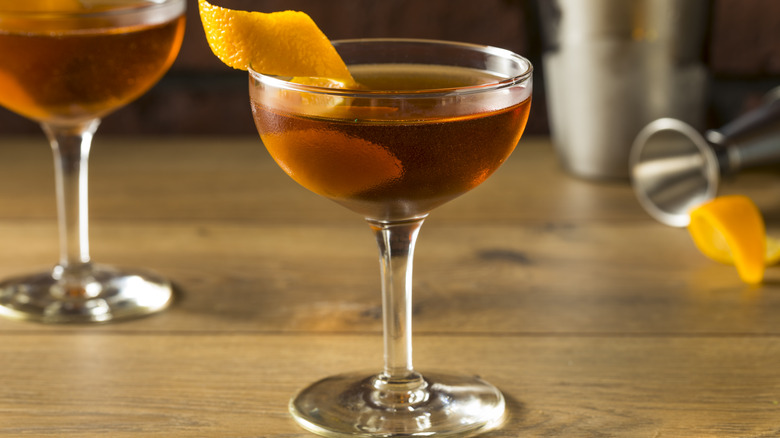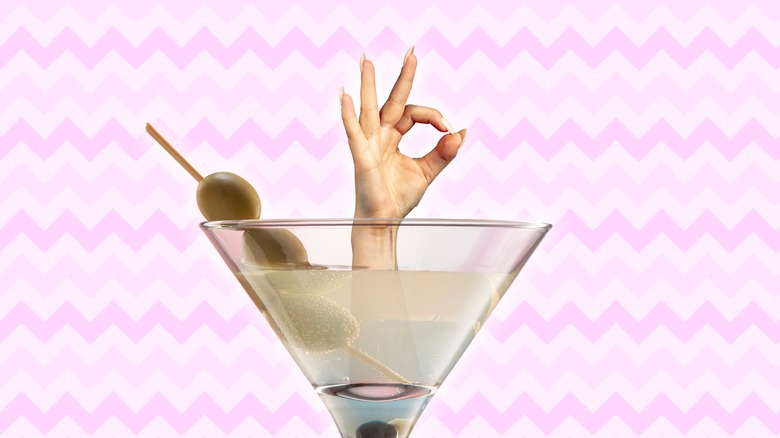13 Tips To Select The Right Type Of Gin For Your Martini
There are a lot of good things to say about gin martinis. Beyond being one of the most timeless and sophisticated ways to catch a buzz, they're also balanced, versatile, and of course, delicious. Another thing to love about the classic cocktail is that there's such a wide range of gins available on the market — and the type of gin you choose can make all the difference in the quality and flavor of your drink. With so many options at your disposal (and let's be honest, the intimidating nature of ordering a martini), choosing a gin can feel overwhelming — which is why we're here to help.
From understanding the basic styles of gin, to planning your garnish before you reach for the bottle, to considering your favorite flavors, there are plenty of tips and tricks you can use to select the right type of gin for your martini. Not to mention, embarking on the boozy journey to finding your ideal base spirit is far from arduous, and experimenting until you find your favorite is a fun exercise in trial and error. Read on to learn the best ways to select the right type of gin for your martini.
Consider your vermouth
Traditional gin martinis only contain a few ingredients, so it's essential that they work in perfect harmony with one another. Other than the gin itself, vermouth is the star of the show when it comes to a martini — and not all vermouths are created equal.
With the exception of a few variations (more on that later), gin martinis usually rely on dry vermouth to impart softness, complexity, and balance to the drink. Dry vermouth can vary significantly in terms of flavor and ranges from relatively neutral and crisp, to floral and punchy, to bright and citrusy. That said, it's best to taste your vermouth on its own before you decide on a gin (which you should taste separately as well) to ensure that the flavors won't clash.
For example, Dolin Blanc is a clean vermouth and light enough that it works with just about anything, while Martini & Rossi Extra Dry needs a bolder, more juniper-forward gin (think Beefeater or Bombay Sapphire) to taste balanced. Thankfully, vermouth is having "a moment" in the drinking world. With more and more options becoming available, there's never been a better time to add a new bottle to your bar cart. Plus, if you're not in the mood for a martini, drinking vermouth on the rocks or with soda is a refreshing, low-octane option.
Think about your ratios
Your preferred ratio for a martini should be one of the first things you think about when selecting a base spirit. If you like your martinis extra dry (which is another way of saying with no vermouth) you'll want to select a different gin than you would if you prefer a wet martini, a dirty martini, or a reverse martini. A good cocktail is all about balance, so if you're adding more (or less) vermouth, brine, or bitters, you'll need to account for that when you think about your gin.
Since vermouth tones down the boozy burn of gin, you can get away with using a more distinct bottle if you're making a martini that includes a standard measure of the fortified stuff. On the other hand, if you like your martini dry or extra dry, it's probably best to stick with an option that goes down a little smoother.
Olive brine adds salinity, so if you like your martinis filthy, you should probably stay away from gins that lean toward the sweeter side. Think about it this way: Honey (which is a delicious note in some gins like Barr Hill) and olive juice are not exactly an ideal match.
Choose within your budget
One of the best things about gin is that you can find a plethora of delicious bottles at almost any price point. With so many options, your choice of gin can (and should) align with your financial intentions.
If you're ready to treat yourself, then by all means opt for a top-shelf bottle. Or, if you want to imbibe on a budget, go for one of the many affordable options at the liquor store or on your favorite haunt's back bar. Most of the gin brands you're probably already familiar with — and which most bars tend to stock — are usually squarely in the middle in terms of price, which makes them wonderfully accessible to people on a wide range of budgets.
One thing we will say is that if you have your heart set on a martini, we don't recommend going for well gin, particularly if it's the low-quality stuff that comes in plastic bottles. Since the spirit is front and center in the cocktail, quality is key. You're better off pivoting to a gin and tonic if you need to be that thrifty.
Pick your garnish
In our opinion, a martini isn't complete without a garnish. Not only do garnishes serve as a nice finishing touch, work to balance flavors, and add a layer of visual interest, but they can also help you choose which gin should serve as the base of your cocktail. Some martini drinkers are more open to different garnishes than others, and there are plenty of imbibers out there who only like their drink with one in particular. If you're one of those people who wouldn't dream of branching out from your usual, then you're best off pairing your gin to your garnish, rather than vice versa. On the other hand, if you want to explore some new garnishes for your next martini, you can start with the gin and go from there.
A salty, briny olive works better with gins that play up more savory flavor elements. A zingy, citrusy twist is better suited for a citrus-forward gin than a pickled onion. These final flourishes impact the overall flavor of any martini, which is why should think about your garnish before you pour no matter what.
Up or on the rocks?
There's one thing we can pretty much guarantee when it comes to ordering (or making) a martini: You'll need to decide if you'd like your beverage up or on the rocks. This decision is more important than you may realize, and it should absolutely be a factor you consider when choosing a gin.
The frozen water in ice not only keeps martinis cold, but also adds dilution which some people enjoy more of in their beverage. You can usually get away with a stronger, more "in-your-face" gin when opting for a martini on the rocks.
Bartenders go to great lengths to ensure martinis both straight up and on the rocks are frosty cold, but a beverage that's directly on ice is always going to stay colder, for longer. Temperature plays a role in how you perceive flavor, which is another reason why you should choose a bolder gin if you're going with the "on the rocks" route. If you choose a gin that's too mild, you run the risk of your martini tasting weak and watered down.
Examine each bottle's ABV
A bottle's ABV (alcohol by volume) is an important number that lets drinkers know much alcohol it contains. While you might think booze is booze, some gins are stronger than others. While most gins fall within a similar enough range that it won't make too much of a difference, there is an exception you should be aware of. Over-proof gin, also called navy strength gin, boasts an ABV of 57.15 % or higher. For reference, a bottle of Hendricks has an ABV of 41.4%. Although it's less common than the standard stuff, some well-stocked cocktail bars will have a bottle of navy strength gin on hand.
Over-proof gin isn't for the faint of heart. However, if your goal is to really take advantage of the effects of ethanol, you can use an over-proof gin in your next martini — just don't say we didn't warn you. We also recommend being heavy-handed with the vermouth if you're using navy strength as the base of your beverage. Doing so will help keep you from falling over as well as make your drink a lot more palatable.
Match your gin with the occasion
Champagne isn't the only beverage that's fit for a celebration. A gin martini can be the perfect drink with which to raise a glass and say cheers to a big moment — and you should choose your gin accordingly to help curate a festive mood. If you're celebrating a special occasion, we highly recommend reaching for a gin that's a little out of the ordinary. Even if you don't want to shell out the big bucks for an expensive bottle, opting for something other than your standard can help make your martini feel special.
You can also choose your gin based on the festivities you have planned for the evening. For example, if you're hosting a James Bond-themed Halloween party, consider making the drink of the night a vesper. This Bond favorite includes vodka, Lillet Blanc, and gin (which in this case should be a classic bottle of London dry). However, please don't shake your martini, no matter what Mr. Bond says.
Explore local options
While it's easy to fall back on the global booze brands you know and love, some of the best gins out there are often made by local distillers. Whether you're traveling or you just want to appreciate your hometown's culture, we highly recommend sampling a locally made gin in your next martini. Since gin is so versatile (and can vary so widely in terms of style and flavor), distillers have the unique ability to showcase local ingredients and traditions in each bottle. Experimenting with local gin can give you insight into the essence of a country or city, and many local brands are often steeped in fascinating history.
So, if you're visiting NYC, order Dorothy Parker as the base of your beverage and spend a little time reading about the American icon from which the brand takes its name. If you find yourself in Japan, try Roku, which contains six quintessential Japanese botanicals.
Understand the different styles of gin
Having a general grasp on what differentiates the different styles of gin can help you find a bottle you'll love for your next martini. Most gins fall under one of five categories, each of which differs in terms of flavor profile and production methods.
One of the most popular varieties of gin is called London dry. This one is what probably comes to mind when the average drinker thinks about the spirit, and its most notable characteristic is that juniper is the most prominent botanical. If you're looking for something sweeter and richer than London dry gin, consider Old Tom gin which works wonderfully in pre-prohibition era cocktails.
Plymouth gin, which is earthier than its London dry cousin, is distinguished by where it's made. Only gin that's made in Plymouth, England can be designated as such. Another style to be aware of is called Genever, which unlike other styles of gin, is distilled from malted wine instead of cereal grains, which gives it a distinct flavor and sometimes color.
Finally, international-style gin features botanicals that wouldn't otherwise be prominent in more classic iterations. With this information under your belt, you can make a more informed decision the next time you find yourself in the gin aisle.
Don't be afraid to experiment
You'll never know if you love martinis made with seaweed-forward gin (yes, that's a thing) unless you try one. So by all means, feel free to experiment! Life is too short to drink boring beverages, so consider this your sign to be bold and reach for a new bottle of gin the next time you're at the liquor store.
Plus, what's the worst that could happen? If you don't fall in love with the first new bottle you try, then you have even more of an excuse to keep sipping and sampling other options. Trust us, experimenting with different types of gin is one of the most enjoyable research projects out there.
Even if you think you don't like gin, we encourage you to keep an open mind and try a few different varieties. You might just need to try a new brand or style to open up a whole new world of beverages.
Match your gin to your martini variation
The world of gin martinis isn't limited to dirty or dry. Serious martini drinkers know that there are other variations of the drink that pair beautifully with some types of gin — and tend to clash with others. With this in mind, you need to construct an entirely different balance of flavors when you're working with anything other than the classic recipe.
The best example of this is when you're drinking a Martinez, which is a martini variation that contains sweet vermouth rather than dry, as well as a bar spoonful of maraschino liqueur. Since, as the name implies, sweet vermouth adds a heavy dose of sweetness to this style of martini, you should use gin that plays up that element. Old Tom gin, which is rich, sweet, and aromatic, works well in this context.
Similarly, if you're making a Surf Club, a martini variation that features absinthe, it's important to choose a gin that won't be at odds with the licorice-like flavor.
Anticipate your food pairing
You should think about a gin martini like you'd think about fine wine. By that we mean the dishes you plan to consume with your beverage should impact your selection. Your ideal gin pairing will vary depending on if you want to wash down a dozen oysters or a filet mignon. A crisp, clean gin pairs well with a heavy steak dinner, while a gin with strong savory notes is a better match for briny seafood.
Pairing gin with food is pretty straightforward. All you need to do is think about each bottle's most prominent botanicals. If you don't know your lemon from your yuzu, that's completely fine — you can still put your pairing skills to work by thinking about flavors in broader terms. When you taste a gin, you can ask yourself if it tastes floral, citrusy, woodsy, or vegetal. Simply putting your favorite gin into one of these categories can make pairing dinner with a martini that's made with the stuff a breeze.
Drink the flavors you enjoy
At the end of the day, the best gin for your martini is the gin you truly enjoy. Whether that means a dry, juniper-heavy London dry-style or a gin so citrusy it makes your mouth pucker, you should drink what you love! People tend to render extremely strong opinions when it comes to how to drink martinis, but we're here to tell you that no matter what anyone might say otherwise, there is no "wrong" gin for a martini.
Some people love floral gins, and others think they taste like potpourri. Some people adore the flavor of juniper, while detractors think it tastes like a pine tree-scented air freshener. There are those who can't get enough herbaceous botanicals, and others think they taste like medicine. The point is, everyone's palate is different, and you should be proud of your preferences. If you don't listen to anything else we say, please remember to order whatever gin makes you the happiest. If it tastes good, then drink it!
